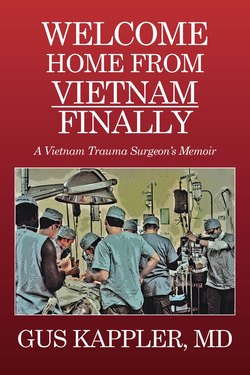Читать книгу Welcome Home From Vietnam, Finally - Gus Kappler MD - Страница 18
На сайте Литреса книга снята с продажи.
FINALLY, THE OR
ОглавлениеThe day after I arrived at the 85th Evac, I was processed and directed to obtain my helmet and flack jacket. As I approached another shanty, this time a pale sickly green, an army sergeant E-6 in a cubby hole opening condescendingly and disapprovingly asked my name, rank, and serial number, i.e., my social security number. There I was in brand-new unwashed OD green fatigues, everything was green, with a face too young to be of major’s rank but being such as a result of the caduceus on my collar point. He asked me my date of rank, and I responded, “August 3, 1970.” He then asked me the date I entered the army, and I repeated, “August 3, 1970.”“No, no, that can’t be,” he repeated over and over as he slammed the opening shut and parted with “come back tomorrow, I can’t take this shit.” So I returned the next day when a more understanding sergeant humorously greeted me with a knowing smile.
The next day, it was down to business. Multiple casualties arrived from the jungle, and the entire hospital base went to work. Any and all personnel who were free of responsibility descended on the ED area to help. My desperately injured patient was a grunt who while patrolling through a small, recently used enemy clearing, spotted a piece of Styrofoam on the jungle floor.
What does a typical eighteen-year-old do but bend over and pick it up? The enemy knew well the psychology of our young soldiers, and predictably, the Styrofoam had been booby-trapped.
His was a major injury in the lower extremities, their arteries, the perineum, genitalia, urinary bladder, and abdominal organs and vessels. I was asked if I could handle it, and Roger told the inquiring surgeon not to worry. My extensive trauma experience at MCV kicked into gear. Since it was my first case, a surgeon who had been in Vietnam a year assisted me, a responsible move. However when, in the OR, it came to prioritizing my patient’s injuries for a timeline of action and the most efficient action to salvage the patient, allowing for perhaps less perfect cosmetic result, my judgments prevailed. Thank you, Dr. David Hume!
This young man’s prolonged surgery required 106 units of blood. He survived the surgery and regained consciousness, but due to the massive tissue damage, prolonged surgery (even with time-saving surgically acceptable shortcuts) and massive transfusion volume, he developed renal, i.e., kidney failure. I accompanied him on a flight to Saigon’s Third Field Hospital for dialysis and was abruptly dismissed by their staff.
“Tree (Dave,) Gus and Roger
I had poured my heart and soul into this boy. I was totally invested in and committed to his survival. I was consumed by him. Then suddenly, I had to turn off the physician and compassion switch and return to the 85th Evac. But that’s medicine. To mentally survive, one has to be efficient in drawing boundaries and move on to the next patient with an unfettered mind. He was my true first patient after residency training. There, one’s actions were monitored, dissected, and altered by a physician more senior in the academic hierarchy. I was now on my own.
A week later, I was notified that he had died.
